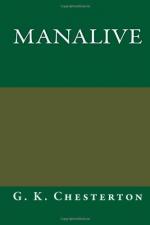As he shunted his big bag, Arthur observed the initials I. S. printed on one side of it, and remembered that Smith had been called Innocent Smith at school, though whether as a formal Christian name or a moral description he could not remember. He was just about to venture another question, when there was a knock at the door, and the short figure of Mr. Gould offered itself, with the melancholy Moon, standing like his tall crooked shadow, behind him. They had drifted up the stairs after the other two men with the wandering gregariousness of the male.
“Hope there’s no intrusion,” said the beaming Moses with a glow of good nature, but not the airiest tinge of apology.
“The truth is,” said Michael Moon with comparative courtesy, “we thought we might see if they had made you comfortable. Miss Duke is rather—”
“I know,” cried the stranger, looking up radiantly from his bag; “magnificent, isn’t she? Go close to her—hear military music going by, like Joan of Arc.”
Inglewood stared and stared at the speaker like one who has just heard a wild fairy tale, which nevertheless contains one small and forgotten fact. For he remembered how he had himself thought of Jeanne d’Arc years ago, when, hardly more than a schoolboy, he had first come to the boarding-house. Long since the pulverizing rationalism of his friend Dr. Warner had crushed such youthful ignorances and disproportionate dreams. Under the Warnerian scepticism and science of hopeless human types, Inglewood had long come to regard himself as a timid, insufficient, and “weak” type, who would never marry; to regard Diana Duke as a materialistic maidservant; and to regard his first fancy for her as the small, dull farce of a collegian kissing his landlady’s daughter. And yet the phrase about military music moved him queerly, as if he had heard those distant drums.
“She has to keep things pretty tight, as is only natural,” said Moon, glancing round the rather dwarfish room, with its wedge of slanted ceiling, like the conical hood of a dwarf.




